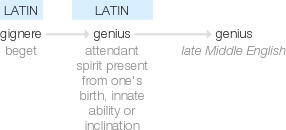Genius
late Middle English: from Latin, ‘attendant spirit present from one's birth, innate ability or inclination’, from the root of gignere ‘beget’. The original sense ‘spirit attendant on a person’ gave rise to a sense ‘a person's characteristic disposition’ (late 16th century), which led to a sense ‘a person's natural ability’, and finally ‘exceptional natural ability’ (mid 17th century).
wiktionary
From Latin genius(“ inborn nature; a tutelary deity of a person or place; wit, brilliance”), from gignō(“to beget, produce”), Old Latin genō, from the Proto-Indo-European root *ǵenh₁-. Doublet of genio. See also genus.
etymonline
genius (n.)
late 14c., "tutelary or moral spirit" who guides and governs an individual through life, from Latin genius "guardian deity or spirit which watches over each person from birth; spirit, incarnation; wit, talent;" also "prophetic skill; the male spirit of a gens," originally "generative power" (or "inborn nature"), from PIE *gen(e)-yo-, from root *gene- "give birth, beget," with derivatives referring to procreation and familial and tribal groups. Sense of "characteristic disposition" of a person is from 1580s. Meaning "person of natural intelligence or talent" and that of "exalted natural mental ability" are first recorded 1640s.
